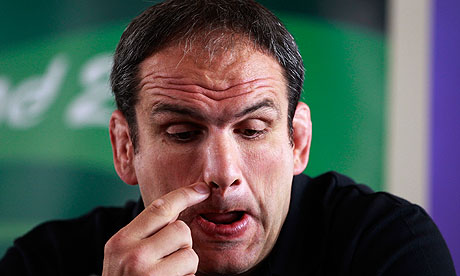
In Twickenham's mess we see a wider British corporate dysfunction – in which plausibly ambitious men award themselves job titles such as operations or performance director while the firm ceases to operate properly and infuriates its customers.
If the Rugby Football Union were an energy company you would listen to Mozart down the line for half an hour while waiting to speak to an employee. It would be in permanent "structural review" or "reporting back" to its management board. Each failure would bring the creation of a new bureaucratic tier and people would be invited to reapply for their own jobs.
This was Martin Johnson's lot this week after a group of players he trusted (and indulged) at the World Cup let him down on and off the pitch. In the RFU's management comedy, the greatest England captain was issued with a 14-day ultimatum to say whether he wanted to keep a position that will probably be taken off him either way.
"I need to know whether he wishes to be considered for appointment," said Martyn Thomas, the RFU's acting chief executive, and himself the subject of a bitter power struggle. "That is not to say he will be appointed or that he won't be."
This Orwellian boardroom‑speak is familiar to those in grassroots rugby who watched the world's wealthiest governing body squander the legacy of 2003 and turn Twickenham into a sort of soulless business park. It always struck me as significant that the big statue outside HQ is of players in a lineout: a typically prosaic representation of set‑piece rugby in a country that has failed to move with more exciting times.
Johnson knew what he was getting into. Karma is probably not high on his concept list but he risked the wrath of fate by stepping over Brian Ashton to take the top job. Ashton, remember, presided over a team who overcame disunity to reach the 2007 final but still lost his title when the RFU fast‑tracked Johnno.
With political schemers at his back, and an untrustworthy World Cup squad in front of him, Johnson walked to his doom, investing too much faith in players who lacked the psychological constitution to repay him: not in the bar, but on the field, where talk of a "lack of leadership" can be interpreted as too many players hiding and letting the coaches cop it.
"Betrayal" is not a matter of counting how many shots were glugged, dwarves thrown, gumshields illegally emblazoned or ferries evacuated – but pinning down the responsibilities of players in matches. Here, England were abysmal, for which Johnson's conservatism and loyalty to underachieving assistants was partly to blame. He looked across his empire and thought it was 2003. The warriors he thought were there were made of smoke. But if you were offered the choice between Johnson and the RFU to go for a pint with, the old gladiator would win every time.
There are now three separate inquiries looking at England's conduct in New Zealand– the Iraq war has been less heavily scrutinised. Twickenham's legal department is even scouring evidence to see whether Mike Tindall and others were in breach of the "elite player squad agreement" and code of conduct, henceforth to be known as Zara's Law.
Fran Cotton's investigation is the big daddy, they say: the inquest to which all others will defer, including that of Rob Andrew, who floats like a ghost between roles. And Cotton, a close ally of Sir Clive Woodward, is already shouting the odds.
"Martin has now been in charge three and a half years and it is very difficult to understand what style of play this England rugby team is all about," Cotton said on television, taking care not to prejudice his own inquiry. "The basic skills of rugby at that level just aren't good enough and I haven't seen an improvement in the last three and a half years."
So Johnson is the meat in a sandwich of feuding committee bores and unreliable players: products of a culture the manager is within his rights not to understand. Before the brief upswing in performances – a storming win over Australia – it was said Johnson had identified a disruptive group who had decided they were superstars on the back of a handful of caps.
If he weeded out some names, the roots were left in place. To make themselves appear busy the RFU will name and shame, and hand out fines. Tindall will do well to hang on to his match fees (£8,000). Often we say of governing bodies – Fifa, sometimes the Football Association – that they have broken down and no longer exist in any meaningful sense. The RFU is at that point. As ever, you feel sorry for all the good people who work there.

